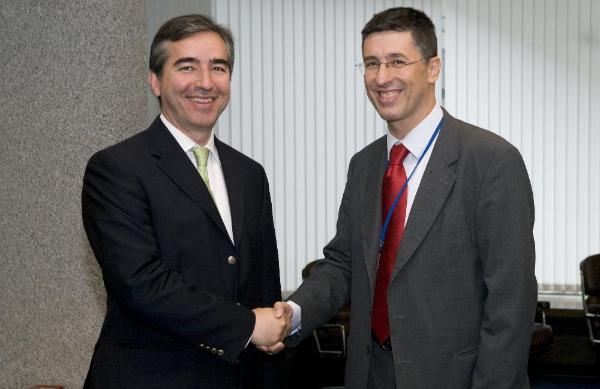
The European Investment Bank is promoting the quality of life in Thessaloniki – the second largest city in Greece and a major business centre for the southern Balkans – with a EUR 250 million loan for the city’s metro system. This concludes the signature of an overall facility of EUR 650 million, approved by the Bank in 2005.
The finance agreement was signed by EIB Vice-President Plutarchos Sakellaris and George Yannis, CEO of Attiko Metro S.A.
At the signing ceremony today in Luxembourg, EIB Vice-President Plutarchos Sakellaris commented: “As a native of Thessaloniki, I feel happy and proud to sign this loan today. Urban infrastructure and the improved quality of life of European citizens is a key priority for the Union, and for us. Our support for the Thessaloniki metro comes some 15 years after our first loan in support of the Athens Metro. As in Athens, the project will improve daily life and the business climate in the city. We are happy to have ATTIKO METRO as a counterpart for a second project.”
The new EIB loan is intended for the design, construction, testing and commissioning of the first phase of the Thessaloniki Metro system comprising 9.6km of underground double track, 13 stations and 1 depot, including repair and maintenance services. The project also includes the required electromechanical and railway systems, as well as the supply of rolling stock. Supplementary works, mainly parking and transfer facilities, diversions of common utility networks and training of personnel, are also included in the project definition. The underground line will stretch from Thessaloniki railway station at the western entrance to the city to the south-eastern part of it.
The overall Thessaloniki Metro project has been the centrepiece of the Greek State’s strategy for providing an efficient and effective public transport system in Metropolitan Thessaloniki, after the successful completion of the Athens network. As such it has been supported by the Greek State, the European Union through EU grants and the EIB. This essential public service project represents one of the most important areas of EIB value added as its ability to provide long-term financing perfectly matches the long-term nature and requirements of the infrastructure provided.
Note to editors:
EIB activity in Greece
About the EIB
What is the EIB?
The European Investment Bank was created by the Treaty of Rome in 1958 as the long-term lending bank of the European Union. The task of the Bank is to contribute towards the integration, balanced development and economic and social cohesion of the EU Member States. The EIB raises substantial volumes of funds on the capital markets which it lends on favourable terms for projects furthering EU policy objectives. It continuously adapts its activity to developments in EU policies.
The EIB enjoys its own legal personality and financial autonomy within the EU. It operates in keeping with strict banking practice and in close collaboration with the wider banking community, both when borrowing on the capital markets and when financing capital projects.
Who are the shareholders?
The EIB's capital is owned by the 27 member countries of the EU. France, Germany, Italy and the United Kingdom each have 16.2%, followed by Spain, with just over 9%.
What types of project does it finance?
There are six financing priorities, which are laid down by the shareholders and EU mainly in the following sectors:
- convergence and cohesion, involving the poorest regions of the EU;
- small and medium-sized enterprises;
- energy;
- research, development and innovation;
- infrastructure;
- environmental protection.
Key figures: the EIB in 2008
Total financing operations: 57.6bn (+21%, compared with 47.8bn in 2007) of which:
EU countries: 51.5bn
Accession countries: 3.4bn
Non-EU countries: 2.7bn
Total stock of financing operations as at 31 December 2008: 355bn (+ 9.2%, compared with 324.8bn in 2007)
Total raised by issuing bonds on the international markets in 2008: 59.5bn (+ 9%, compared with 54.7bn in 2007), raised via 247 issues in 18 currencies
Total stock of funds raised as at 31 December 2008: 253bn (246bn in 2007)

Photographer: EIB ©To be defined
Download original

Photographer: imedia ©To be defined
Download original

Photographer: EIB ©To be defined
Download original